|
Volkswagen New Beetle
Debut: 1997
Maker: Volkswagen
Predecessor:
Beetle |
|
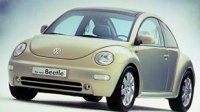 Beetle
is back! Volkswagen unveiled the "second generation" Beetle in the 1998
Detroit motor show, hoping it to revive the company's fortune in North
America. You might not know, the original Beetle is still producing in
Brazil, more than 60 years after the first prototype launched in 1936.
Of course, in 1998 you won't expect a rear-engined air-cooled new car
anymore,
so I think you won't surprise that the new Beetle is based on the
front-engined,
front-wheel drive Golf Mk IV platform. Same structure, same
suspensions,
but the Beetle is 59mm shorter and 10mm narrower, moreover, it is a
strictly
3-door. The cute styling originated from the "Concept 1" show car which
is very loyal to the original Beetle, it can easily attract young
customers.
Cabin is also designed like a show car. Beetle
is back! Volkswagen unveiled the "second generation" Beetle in the 1998
Detroit motor show, hoping it to revive the company's fortune in North
America. You might not know, the original Beetle is still producing in
Brazil, more than 60 years after the first prototype launched in 1936.
Of course, in 1998 you won't expect a rear-engined air-cooled new car
anymore,
so I think you won't surprise that the new Beetle is based on the
front-engined,
front-wheel drive Golf Mk IV platform. Same structure, same
suspensions,
but the Beetle is 59mm shorter and 10mm narrower, moreover, it is a
strictly
3-door. The cute styling originated from the "Concept 1" show car which
is very loyal to the original Beetle, it can easily attract young
customers.
Cabin is also designed like a show car.
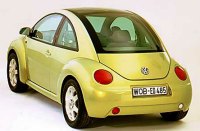 Compare
with its mother, Golf, the Beetle seems to be inferior in every
objective
aspect. Firstly, it has less rear cabin space due to the ecliptic roof
line. Secondly, the swoopy boot shape reduce cargo space from 330
litres
to 209 litres. Thirdly, while the Golf uses Audi's 20 valves 1.8 litres
engine (with or without turbo), Beetle still relies on the 115hp 8
valves
2 litres engine carried over from the last generation Golf. However,
when
later the Audi 1.8 turbo engine and even the VR6 are available, Beetle
will be more desirable. Compare
with its mother, Golf, the Beetle seems to be inferior in every
objective
aspect. Firstly, it has less rear cabin space due to the ecliptic roof
line. Secondly, the swoopy boot shape reduce cargo space from 330
litres
to 209 litres. Thirdly, while the Golf uses Audi's 20 valves 1.8 litres
engine (with or without turbo), Beetle still relies on the 115hp 8
valves
2 litres engine carried over from the last generation Golf. However,
when
later the Audi 1.8 turbo engine and even the VR6 are available, Beetle
will be more desirable.
The
new Beetle is
produced
in Mexico like the US-selling Golf. Price is about US$ 15,000 for the
petrol
version, that means very competitive. However, competition is not what
Volkswagen thinking. The company wants the new Beetle to be an Icon
Car like the original Beetle. If this turn out to be
reality,
new Beetle will comfortably enjoy a long waiting list without worrying
competition. |
| The
above report was last updated in 1998 . All Rights Reserved. |
Beetle 1.8T
|
Forget
the
disappointing 8-valve
engine, Volkswagen finally put a decent engine into the New Beetle to
match
its fresh image. As you know, the five-valve-per-cylinder, turbocharged
1781 c.c. unit was originally developed by Audi but it has been
spreading
to the whole Volkswagen empire, such as Golf GTi and Seat Ibiza Turbo.
One hundred and fifty horsepower accompany with a flat torque curve. No
turbo lag, really.
European
testers
used to
say the New Beetle has handling better than its donor Golf, not just
because
of the 16-in diameter 205mm width rubbers. This means the Bug will cope
with high power better than Golf GTi even without upgrading the tyres.
It is. Now you have the power to slide the the car in tight corner.
However, to
eliminate the
high speed lift generated by the swoopy roof there is a small,
speed-raised
spoiler added to the top edge of rear window. Now it looks more and
more
like a 911 ! |
| The
above report was last updated on 8 Aug 99. All
Rights Reserved. |
Beetle RSi
|
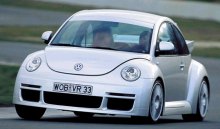 Ha,
what do you think about this car? Funny or serious? Ha,
what do you think about this car? Funny or serious?
You
may call it
funny because
this retro bubble thinks itself as a 911 Turbo. Look at that whale-tail
! that huge air dam and 80mm wider body, it reminds you some years ago
you saw many Beetle Club members modified their old, original Beetle
like
this, and you couldn’t help laughing out loud. Inside, the Beelte RSi
tries
to replicate another classic - Audi TT. Black background, aluminium
grab
handles, chromed gauges, carbon-fiber door panels ... all look like the
TT. The beautiful gear lever is actually the same item as TT’s. The
Recaro
racing buckets are mounted so low that visibility is hurt by the
super-long
dashboard, while the whale-tail limits rear vision in a similar
way.
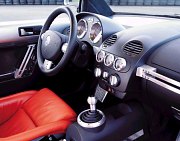 You
may call it serious as well because the chassis is pure TT - and the
top
TT - that means the same suspensions and 4-wheel drive. The powertrain
is no less serious, something derived from the Golf VR6 but only more
serious.
Stroked to 3.2 litres instead of 2.8, the compact 15° V6 pumps out
225 hp instead of 204, and a massive 35 lbft more torque. The
transmission
is the same 6-speed manual as its sister cars. So it is Volkswagen’s
interpretation
of the top TT. Concerning chassis, there is a carbon-fiber tower strut
to tighten rear suspensions, and then some big brakes and 18-inch wide
rubbers. Serious. You
may call it serious as well because the chassis is pure TT - and the
top
TT - that means the same suspensions and 4-wheel drive. The powertrain
is no less serious, something derived from the Golf VR6 but only more
serious.
Stroked to 3.2 litres instead of 2.8, the compact 15° V6 pumps out
225 hp instead of 204, and a massive 35 lbft more torque. The
transmission
is the same 6-speed manual as its sister cars. So it is Volkswagen’s
interpretation
of the top TT. Concerning chassis, there is a carbon-fiber tower strut
to tighten rear suspensions, and then some big brakes and 18-inch wide
rubbers. Serious.
Is it ? sorry,
this super
Beetle tips the scale at 1515 kg, some 120 kg more than the TT,
therefore
less responsive to corner. Grip and traction is abundance, but it loses
a bit sharpness. In straight line, it is also slower than the 225hp TT,
although the margin is smaller.
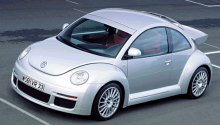 Funny,
Volkswagen claimed the whale-tail rear spoiler generates a positive
77kg
downforce at 160mph, but the problem is: this car CANNOT reach 160mph.
The funny drag coefficient of 0.40 plus large frontal area limit it to
just 140 mph, no wonder road testers found it unstable at Autobahn
flat-out. Funny,
Volkswagen claimed the whale-tail rear spoiler generates a positive
77kg
downforce at 160mph, but the problem is: this car CANNOT reach 160mph.
The funny drag coefficient of 0.40 plus large frontal area limit it to
just 140 mph, no wonder road testers found it unstable at Autobahn
flat-out.
And the most
funny is that
Volkswagen asks for a price dearer than M3 or Boxster S, in other
words,
exactly 3 times of a Beetle 2.0. In return the customers get guarantee
their car will be very rare - just 250 units will be built in a limited
production run. Funny, a People’s Car rarer than a Lamborghini Diablo !
|
| The
above report was last updated on 16 June
2001. All Rights Reserved. |
|
|